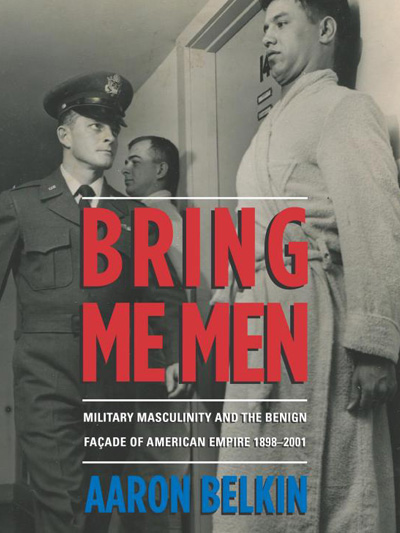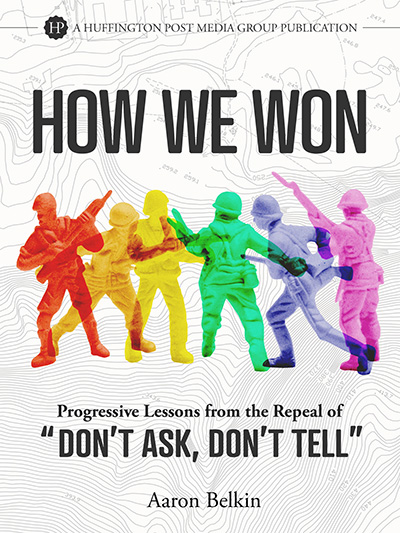I used How We Won: Progressive Lessons from the Repeal of "Don't Ask, Don't Tell" as a resource for a social
change foundational course at my graduate-level institution. I chose the text because it seemed like a good
segue from the first half of the course on social change theory to the second half of the class on social
change
practice. In particular, I imagined it would be useful to illuminate notions of power and oppression, and
framing theories. And it was.
Students read the text thoroughly and were very enthusiastic about all that they learned through reading the
text. The enthusiasm was a result of the book's accessibility, clarity of style, and many concrete examples.
Students were amazed at author Aaron Belkin's own personal efforts, yet they seemed to feel that these were
strategies that would primarily be engaged by an elite economic class of people. Belkin appears as an
individual
with tremendous social capital and privilege within his social location. The Palm Center has access to media,
government, and the academy that most people do not have. This was not a criticism of the program, but caused
these students to wonder if they would ever be in a position to mobilize these kinds of resources, and how
excluded or distant the low-income gay person/community might feel from such a reality. The class came to
realize, however, that those resources and connections were likely developed over a period of time, also the
hard work of social change.
We combined reading How We Won with watching segments of documentary How To Survive a Plague (on Democracy
Now!). We compared and contrasted some of the tactics within the broader GLBTQ movement. Both Belkin and the
movie-makers discussed the inside-outside perspective on social change. This approach was great for students
to
consider multiple perspectives about working inside and outside institutions, with an openness to a diversity
of
tactics. I appreciated that at many points in the book the author mentioned and affirmed that there were many
other active groups and different tactics being employed which were critical to the success of the "Don't Ask,
Don't Tell" (DADT) repeal efforts. This helped students to see that diverse approaches within the same social
change movements do not necessarily have to be antagonistic (though they often are).
Students struggled with whether or not it is really true that people in general and "the public" will change
their minds when they are presented repetitively with the truth, which is part of the Belkin's argument. The
author notes that a single issue and clear focus allowed for the success of the campaign, but also recognized
that many issues are not like that. Students felt that no issue they could think of or were committed to
personally (anti-incarceration, immigration, pro-choice, the environment and climate change, etc.) provided
this
kind of clarity. Nonetheless, they learned that clarity in framing and communicating one's message is
incredibly
important, and something they should analyze and attempt in relation to any given dimension of their work.
Being
at a graduate-level school of theology, our students are engaged at some level in moral discourse in relation
to
their passionate social issues. Belkin mentioned that religious-moral discourse, particularly in relation to
sexual orientation, can be a detriment to dialogue; or a complication at the very least to advancing causes
because of the intractability of hardened moral positioning. This was important information for reflection.
At our progressive seminary, we often discuss the nature of oppression and whether our social change
commitments are primarily reformist or if they address deeper structures and mechanisms of injustice. From
this
perspective, students questioned how important the DADT repeal success is in actually dismantling homophobia.
They asked the same question of the gay marriage movement. They had no answers for these questions, but were
hopeful that increasingly out persons in relationships to straight people will transform homophobia, and that
the repeal of "Don't Ask, Don't Tell" will hopefully be one small piece of engendering these open
relationships
among people in their authentic being in the military context.
All of us also admired the author's willingness to identify and admit to the re-inscription of militarism
through the repeal campaign efforts. We watched another DemocracyNow! segment in which Belkin discussed the
repeal with activist Mattilda Bernstein Sycamore. In this discussion, students were impressed with how honest
Belkin was about the limits of the DADT strategy and the difficulties of working across coalitions of GLBTQ
persons with various agendas and socio-political perspectives. The students were moved by how hard it is to
stick to one's convictions with such clarity as the author did, particularly when people within one's own
broader movement of liberation are being critical. They were very pensive and inspired by the author's example
in this regard.
Belkin doesn't really define what progressive means. There is an underlying assumption that all progressives
share the same agenda; a commitment to inclusivity of some sort. Students wondered, as they often do in
graduate
education, what we mean when we toss around different terms, when we take them for granted that everyone seems
to know what we mean. So it might have been helpful for the author to define this term and be more specific
about the lessons for progressives across different issues.
I highly recommend this book for use in social change and social movement classes, particularly in
combination
with other related resources that broaden the scope of the conversation.

